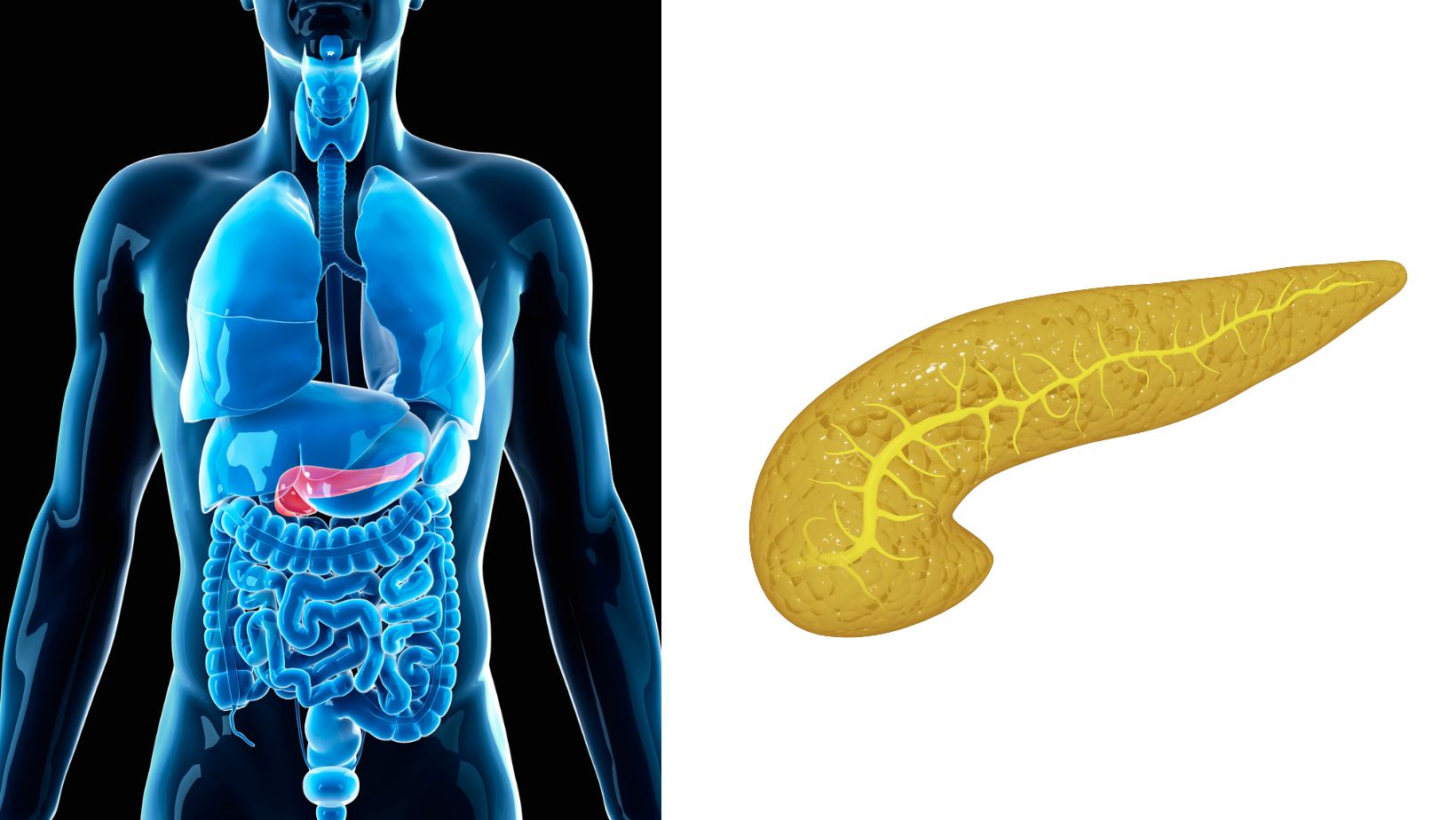Grass-fed beef pancreas with liver - 180 pcs kvalitní nizozemské sušené orgány v kapslích - 180 kapslí

Za nákup Vám přičteme:
+1432.5 Bodů do Bonusového programu Pancreatic Strength in a Capsule by Modern Native
Pancreatic Strength in a Capsule by Modern Native
The pancreas is specific for the production of enzymes, including amylase, lipase and protease. It is an important body involved in digestion of food a regulating blood sugar levels.
Ingredients
- 1500 mg freeze-dried beef pancreas
- 1500 mg freeze-dried beef liver
- beef gelatin (capsule)*
*Beef gelatin capsules dissolve quickly in the stomach thanks to hydrochloric acid, regardless of whether they are taken with food or on an empty stomach. However, the contents of the capsules, i.e. lyophilized organs, may better support nutrient absorption in certain situations:
Taking with food:
-
Fat-soluble vitamins (A, D, E, K): these vitamins need fat to be absorbed, so it is ideal to take capsules with food that contains healthy fats (e.g. avocados, nuts, olive oil).
-
Prevention of discomfort: some people may experience nausea or stomach discomfort when taking capsules on an empty stomach, which food minimizes.
Taking on an empty stomach:
-
Fast absorption: water-soluble B vitamins and minerals are absorbed efficiently even without food.
-
Quick Energy: Taking capsules on an empty stomach can be useful if you are looking for a quick energy boost or to replenish nutrients during the day.
For best absorption of fat-soluble vitamins, I recommend taking the capsules with a fat-containing meal. However, if they are taken on an empty stomach and there are no digestive problems, this may also be appropriate. The choice depends on personal needs and tolerance.
When it comes to capsules containing freeze-dried pancreas in a gelatine shell, the role of the pancreas in digestion must be taken into account. The pancreas produces enzymes that help digest proteins, fats and carbohydrates, and also releases bicarbonate, which neutralizes stomach acids. This is important for the proper function of enzymes in the intestines.
If a person is taking pancreatic capsules to aid digestion, it is best to take them during meals. This allows the enzymes contained in the capsules to engage in the digestive process and promote the breakdown of nutrients, especially fats. However, if you are taking the capsules as part of your overall recovery or body support, you can also take them on an empty stomach. In this case, however, it does not directly support digestion, rather it is a longer-term approach to pancreatic regeneration.
It is a good idea to start with a smaller dose and watch how the capsules affect the person. If he has significant digestive problems or is unsure when and how to take it, it is definitely advisable to consult a specialist.
Why choose organ meats from Modern Native
- It comes from 100% grass-fed cattle.
- No hormones.
- Pesticide and GMO free.
- The animals live stress-free and completely in the wild.
Dosage
- Recommended is 6 capsules per day (3000 mg).
- 6 capsules are roughly equivalent to 15 fresh organs.
Nutritional values
Enzymes: lipase, protease and amylase.
|
Nutrients |
For 1 dose |
| Vitamin A | 2751 IU (112% RDA*) |
| Vitamin B12 | 12.53 mcg (448% of RDA*) |
*RDA = recommended daily allowance
Sources of raw materials
- The ingredients in these food supplements come from grass-fed beef from the Netherlands.
- Because the cows are raised on natural pastures and are well cared for, the nutrients are optimally preserved and you get better quality organ meat.
- The main suppliers of organ meats for Modern Native are Zorg & Natuur (Care & Nature), Vlees van Ons (Meat from Us) and Reestdal Rund (Reestdal Beef).
Why local Dutch farms?
- This business provides a livelihood for local ecologically minded farmers.
- It creates jobs in the sector and thus supports the creation of more organic farms and ranches.
- Where there is more demand, there will be more supply. This will eventually allow the price of quality meat, including organ meat, to fall.
More local organic farmers means less traditional herds (meat production) and happier Dutch cattle.
- Money spent on farms stays in the economy, which has a domino effect and creates more jobs on other local farms.
- Shorter distribution chains reduce unnecessary transport.
- Where cattle are raised according to organic standards, the soil is healthier. Naturally grazing cattle return nutrients to the soil through the urine and manure they excrete.
Why supplement the pancreas or pancreas
The bovine pancreas is a small organ located near the stomach that helps with digestion and stabilizing blood sugar levels. The pancreas is also part of the cow's endocrine system, as it releases digestive enzymes and hormones into the cow's small intestine. [1]
The benefits of beef pancreas are numerous and can be aptly described by the ancient belief that eating the organ(s) of an animal strengthens the corresponding organ of the consumer. In other words: like promotes like.
Consumption of pancreatic enzymes provides the body with a number of unique enzymes, including: [2]
- Lipase
- Protease
- Trypsin
- Amylase
- Colipase
Vitamins in the pancreas
Vitamin B5
B5, also called pantothenic acid, plays a key role in cholesterol synthesis. This endogenously produced cholesterol can then be used to produce youth-related hormones such as pregnenolone and DHEA. [3]
Research has found that B5 also has beneficial effects on the skin. Animal studies show that B5 can accelerate wound healing and repair (especially when used in conjunction with vitamin C) [4]
B5 deficiency, although rare, can cause chronic fatigue, sleep problems, mood disorders, neuropathy and respiratory infections. [5]
Vitamin B12
- Beef pancreas is an excellent source of vitamin B12 and is one of the best natural sources of B12 in the world, next to beef liver.
- B12 is one of the most important B vitamins.
- It aids in energy production throughout the central nervous system and periphery. B12 even helps the body make DNA, the genetic material that is present in all cells. [6][7]
- The older population is deficient in B12. There is currently no consensus or guideline for diagnosing this deficiency. A definitive diagnosis is most often based on clinical symptoms together with laboratory evaluation (low serum vitamin B12 and elevated serum homocysteine or methylmalonic acid) and response to treatment. Treatment and replacement with oral vitamin B12 may be as effective as parenteral administration in patients with pernicious anaemia. The suggested oral dose of vitamin B12 is 1 mg daily for one month, followed by a maintenance dose of 125 to 250 µg in patients with dietary insufficiency and 1 mg daily in patients with pernicious anemia. [8]
- Effects of folic acid and vitamin B12 supplementation on cognitive impairment and inflammation in patients with Alzheimer's disease: a randomized, single-blind, placebo-controlled trial. Folic acid and vitamin B12 supplementation showed a positive therapeutic effect in AD patients who were not on a folic acid-enriched diet. [9]
Selenium
Beef pancreas is a much better source of selenium than most animal products. Although true selenium deficiency is rare, increasing selenium intake can help maintain proper thyroid function and boost metabolism.
Read more on this topic
Additional parameters
| Category: | Dried organs (offal) |
|---|---|
| EAN: | 8720589464117 |
| Proč koupit: | Nizozemská firma, která vyrábí a prodává vysoce kvalitní doplňky stravy. Jsou jimi koncentrované a lyofilizované orgány v kapslích. Jejich posláním je přinášet moudrost našich předků zpět do moderního světa, pro optimální zdraví. |
| Výrobce: | Modern Native B.V. Flevolaan 10, 9501 VG, Stadskanaal, The Netherlands |
| Země původu: | Nizozemsko |
| Vhodné pro: | Bez lepku-Sugar Free-Soy Free-GMO Free-Low Carb-Keto-Paleo |
Be the first who will post an article to this item!
Be the first who will post an article to this item!

Our ancestors lived differently from us. Traditional societies have been eating organ meat for centuries. They did it for a reason. Intuitively, they knew it was good for them. They knew that organ meats were the source of the most important nutrients. Similarly, in nature many predators go after organ meat first and muscle meat second.
We hardly eat organs these days. It's an ancient tradition that has faded away. Modern Native's mission is to bring the wisdom of our ancestors back to the modern world for optimal health, strength and happiness.
There is no organ meat like meat
Not all organs are the same. When looking for quality (organ) meat, it is important to check several points:
- 100% grass-fed cattle
- Without hormones
- Pesticide and GMO free
- Animals live stress-free and completely in the wild
The term "grass-fed" doesn't tell the whole story. The cow may be partially outside in the summer eating fresh grass, while most of the time she is in the barn and fed concentrate. 100% grass-fed, that's the Modern Native way of doing things. They only work with farmers whose cattle meet the above points. The organs are obtained from cattle in the Netherlands.
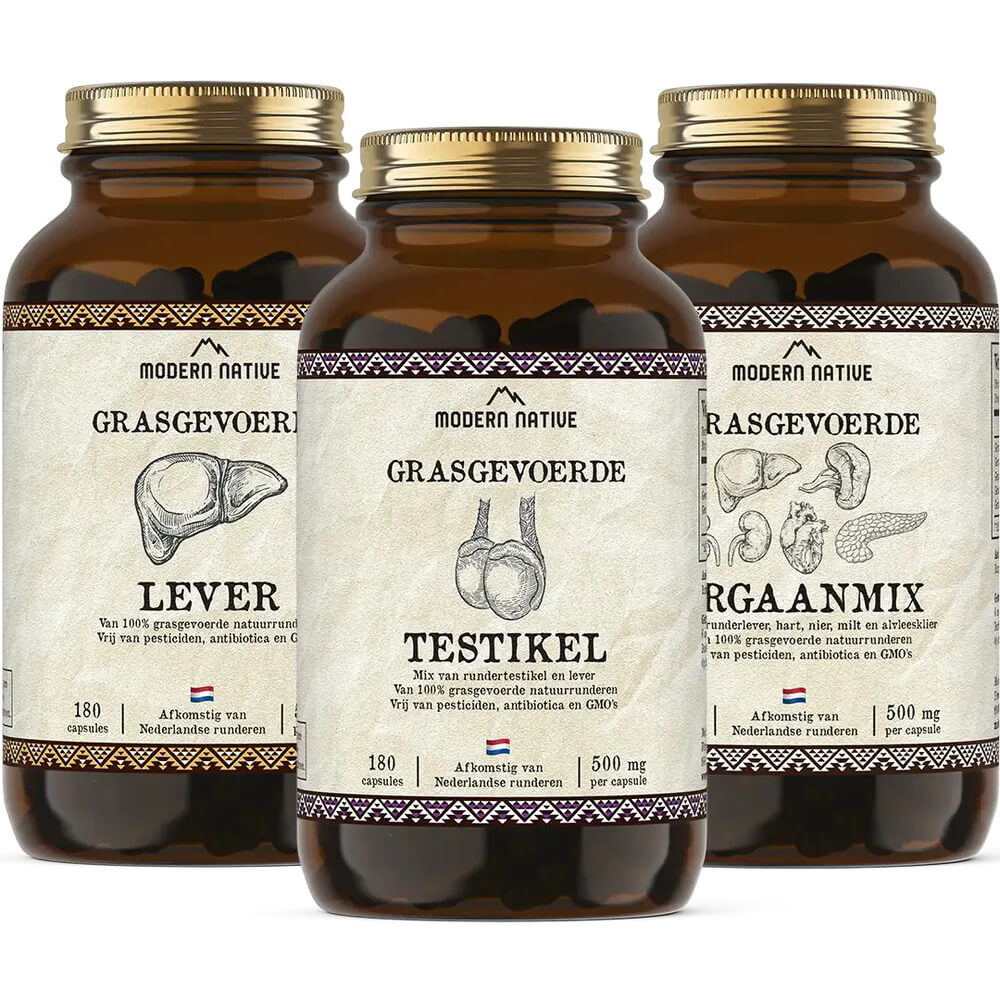
Why local cattle?
- It maintains the health of local natural farmers and creates jobs in the industry, thus creating more natural farmers in the Netherlands.
- Where there is more demand, there will be more supply. This will eventually allow the price of quality meat, including organ meat, to fall.
- More local natural farmers means fewer traditional herds (mass production) and happier cattle.
- Money spent on local farms stays in the economy, which has a domino effect and creates more jobs.
- Shorter distribution chains reduce unnecessary transport.
- When there are more natural livestock, healthier soil is created.
- Naturally grazing cattle return nutrients to the soil through the urine and manure they excrete.
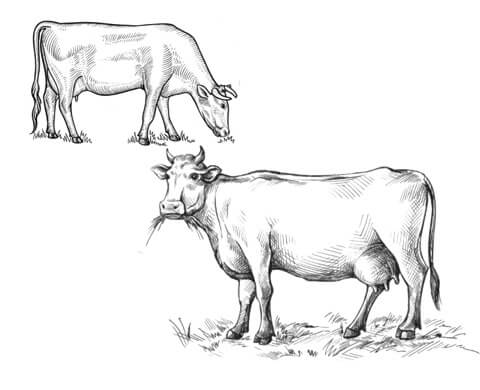
Method for Modern Native accessories
- It comes from 100% grass-fed cattle.
- No hormones.
- Pesticide and GMO free.
- The animals live stress-free and completely in the wild.
Why eat organ meat?
Beloved by our ancestors
Traditional peoples, Native Americans, and ancient ancestors believed that consuming the organs of a healthy animal would promote the health of the individual's organ. They ate "from head to tail", i.e. everything from the animal, because they intuitively knew how nutritionally rich the meat from the organs was.


.jpg)

























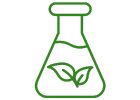



























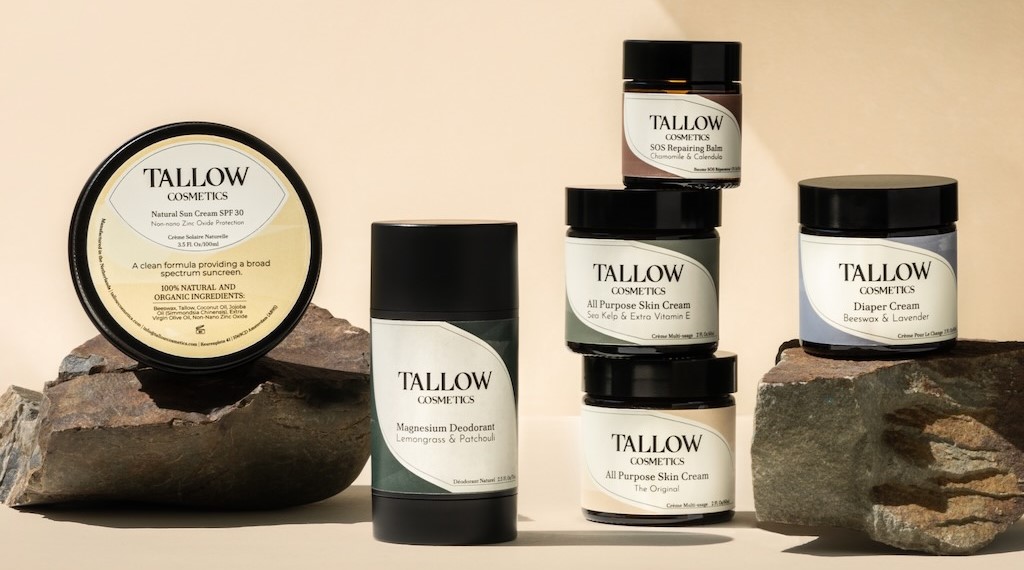





_small.jpg)


